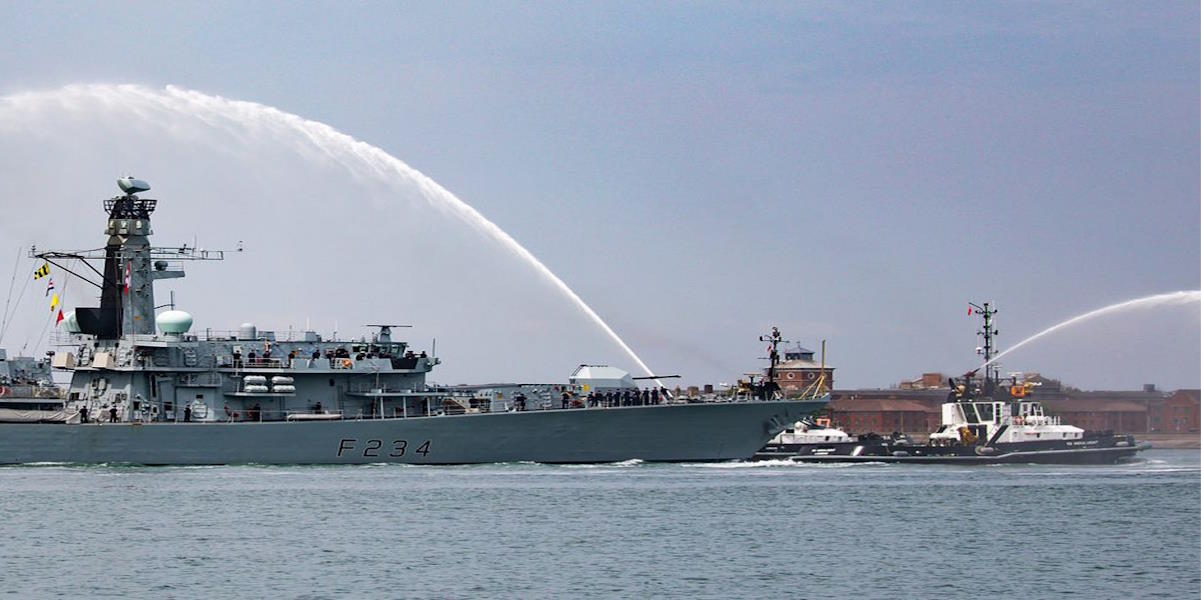In an increasingly contested maritime environment, staying at the forefront of innovation is vital to enable the UK and its allies to promote peace, security, and prosperity in the maritime domain. Technological advances within the naval sphere will be prominent at this year’s Defence and Security Equipment International (DSEI). The event will host three Royal Navy and three international ships from 12th – 15th September at London’s ExCel Centre.
The visiting naval vessels will give DSEI attendees an exclusive showcase of not only the UK’s maritime technology and capabilities, but also that of international partners.

The visiting ships this year include:
- Royal Navy Type 23 Duke-class frigate, HMS Iron Duke
- Royal Navy, P2000 Archer-class patrol vessel, HMS Pursuer
- Royal Navy, P2000 Archer-class patrol vessel, HMS Puncher
- Dutch Navy, De Zeven Provinciën-class frigate, HNLMS De Ruyter
- German Navy, German F125 Class, FGS Baden-Württemberg
- Belgian Navy, P901 Castor patrol vessel, BNS Castor
HMS Iron Duke
The Royal Navy’s HMS Iron Duke has recently returned to frontline service after undergoing the most complex overhaul of any Type 23 frigate to date. With more than 1.7 million hours of work completed by the collective efforts of shipwrights, engineers, technicians and experts – both civilian and Royal Navy; HMS Iron Duke returns to service as the most technologically advanced frigate.
With technological upgrades taking centre stage at this year’s DSEI, the Iron Duke represents the first of a series of successful technological upgrades to older ships with the LIFEX programme. This includes significant upgrades to electronic equipment, including communications, navigation and weapon systems to counter more sophisticated threats of 21st century warfare. The refit will enable HMS Iron Duke to remain at the forefront of naval operations until her successors, the Type 26s and 31 frigates begin to enter service later this decade.
HMS Pursuer and HMS Puncher
Also set to be at DSEI are two Royal Navy inshore patrol vessels, HMS Pursuer and Puncher. As part of Coastal Forces Squadron which operate across the UK and as far as the Baltic Sea and Gibraltar, the P2000 Archer Class patrol crafts are unique in their ability to operate in ports and confined waters that are not accessible to warships and can be used to support roles from safeguarding Britain’s nuclear fleet and maritime security to participating in NATO overseas operations and training the next generation of naval officers. More recently, HMS Puncher has played a key role in expanding the UK’s underwater warfare (UW) capabilities with recent Autonomous Underwater Vehicle trials.
DSEI has an increasing ambition to deepen naval partnerships and interoperability among allies, it is also set to host 3 international ships from Germany, the Netherlands and Belgium.
FGS Baden-Württemberg
Representing the German Navy at DSEI, the FGS Baden-Württemberg is one of the largest frigates in the world. It is primarily designed for low and medium intensity warfare and maritime stabilisation operations but can also contribute to sea-to-land tactical fire support, asymmetric threat control at sea and support of special forces as well as military evacuation operations. In the lead up to DSEI, the German frigate was engaged in operational sea training within the North Sea.
HNLMS De Ruyter
Echoing a push across allied NATO maritime forces to revitalise naval capabilities, the Netherlands ship, HNLMS De Ruyter is a De Zeven Provinciën-class air defence and command frigate, has also received a mid-life technological upgrade. These upgrades have expanded the versatility of the ship, expanding its capabilities to protect a fleet across the environments and host a complete operational staff on board.
BNS Castor
The Belgian Navy’s BNS Castor reinforces the Coastguard structure and operates predominantly within the Belgian Exclusive Economic Zone (EEZ) but can be deployed wider within Europe. BNS Castor conducts the following tasks: security of critical maritime infrastructure, monitoring of non-NATO units, fishery and customs inspection, anti-pollution operations, MARPOL inspections and search and rescue operations at sea.
Alongside the visiting ships, the maritime domain is well represented with the Naval Zone set to entice visitors with an interactive showcase of the latest vessels and naval technology. The Royal Navy will have a strong presence at DSEI and will host a stand that will focus on the Future Air Dominance System concept, surface and underwater UAVs, missile systems and will feature interactive displays.
“This year DSEI’s Naval zone is set to display an array of innovative solutions that will address the most complex challenges the UK and its allies face in an increasingly contested maritime environment. As with other domains, there will be a heavy focus on how the widespread adoption of disruptive technologies can not only be used to build better, more agile maritime equipment and machinery, but also how it can be used to improve the longevity of vessels, transforming older parts of the fleet to expand capabilities and gain the strategic edge.
One of the unique aspects of DSEI is that with its location in London’s docklands, it can showcase ships. This year, we welcome ships from the United Kingdon, Germany, the Netherlands and Belgium, reinforcing one of the most crucial aspects of the tradeshow which is to foster collaboration and partnerships with our closest allies.
Rear Admiral (ret) Jon Pentreath, DSEI’s Senior Naval Advisor
The presence of the visiting ships at DSEI will be subject to operational availability.
Source: DSEI news release



